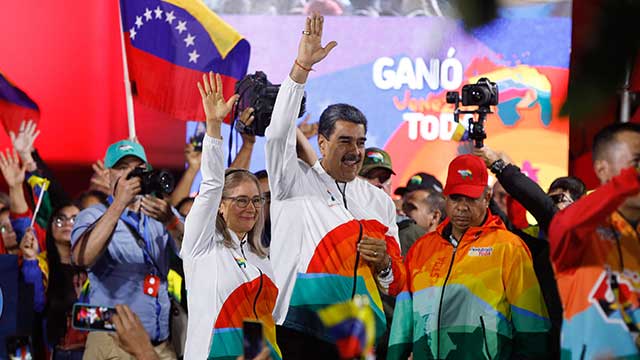
Conflicts between the two countries are intensifying as Venezuela has passed a referendum claiming sovereignty over neighboring Guyana’s oil reserves and has decided to pursue oil exploration in a speedy manner.
According to Reuters and AFP on the 5th (local time), Venezuelan President Nicolas Maduro announced that he would allow oil exploration in Guayana Ezequiva, which is scheduled to be built in the 159,500 square kilometers west of the Ezequi River.
Currently, the area, which is Guyana’s land, is estimated to have a large amount of resources, including gold and diamonds. It accounts for more than two-thirds of Guyana’s total land area (210,000㎢), which is similar to the size of the Korean Peninsula, and 125,000 people live in Guyana’s total population (800,000 people).
Venezuela has claimed sovereignty when offshore oil and gas were discovered here, but held a referendum on the 3rd and decided to incorporate the region into its territory with 95% of the total support.
The International Court of Justice (ICJ) ordered Venezuela on the 1st to “refrain from any act that threatens Guyana’s sovereignty,” but Venezuela decided not to recognize the ICJ’s jurisdiction in a referendum.
On the same day, Maduro announced that he would create related departments in state-owned oil company PDVSA and state-owned steel company CVG for oil exploration, and immediately issue related licenses.
In addition, companies operating in the sea in the region were notified that they had to leave within three months.
In the waters, a consortium led by ExxonMobil has been producing oil since 2019. Guyana started a new bid in September for permission to explore the waters.
However, Maduro distanced himself from immediate military action, saying, “We will create an army for conflict zones, but the troops will be stationed in neighboring Venezuelan states.”
Guyana said he would ask the United Nations for help if Venezuela took further action after the referendum.

Justice Minister Anil Nandral told AFP, “If there is any action or related attempt after Venezuela’s vote, we will appeal to the UN Security Council as a victim.”
Referring to Articles 41 and 42 of the UN Charter, which allows military action to maintain international peace and security, he also argued that “the UN Security Council can approve the use of force by member states to support the ICJ’s enforcement of orders.”
Nicholas Watson of U.S. consulting firm Teneo Holdings analyzed that the territorial dispute is characterized by an attempt to unite Maduro’s supporters ahead of next year’s presidential election.
He also pointed out that the attempt did not appear to be successful, given that the actual voter enthusiasm was low, contrary to the government’s official announcement that the turnout of the referendum was close to 50%.
Meanwhile, the U.S. has hinted at the possibility of reintroducing oil export bans on Venezuela.
The U.S. State Department said in October that as a condition of easing sanctions, Maduro’s administration demanded that political prisoners and Americans who were unjustly detained be released from office by lifting the ban on opposition candidates, but the measures were not being implemented properly.
“We are continuing to talk to Maduro’s administration about creating conditions for a more democratic, prosperous and safe Venezuela,” said Brian Nichols, assistant secretary of state for the Western Hemisphere.
The U.S. Treasury Department imposed sanctions to halt oil exports from Venezuela to the U.S. in 2019 over allegations of fraudulent elections surrounding Maduro’s re-election in 2018.
JULIE KIM
US ASIA JOURNAL



